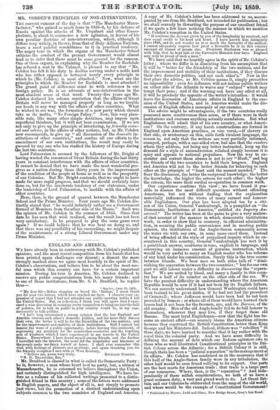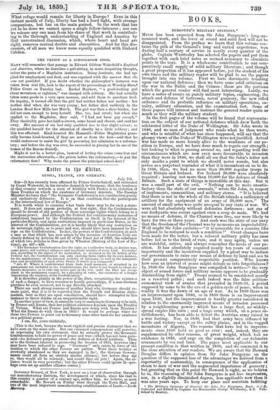ENGLAND AND AMERICA.
WE have already been in controversy with Mr. Cobden's published opinions, and the most recent composition from his hands that has been printed again challenges our dissent ; e, dissent the more strongly marked since we agree most heartily in the spirit of Mr. Cobden's observations, and believe him to be about the most use- ful man which this country can have for a certain important mission. During his tour in America, Mr. Cobden declined to receive any public congratulations from his many friends ; and to one of these invitations, from Mr. S. D. Bradford, he replies thus-
" Quebec, June 18, 1859.
" My dear Sir—Before stepping on board the Indian,' I must thank you for your two letters, which have reached me here. I observe your ex- pression of regret that I had not attended one public meeting before I left the United States. But, on reflection, I think you will agree that I exer- cised a wise discretion in resisting every temptation to bring me into the field of politics, for to talk in public in your country would be, in may case, necessarily to talk politics.
"I have long entertained a strong opinion that the less England and America canvass each other's domestic polities, and the more they discuss their own, the better it will be for the friendship of the two nations, and for the improvement and stability of their institutions. Still I cannot but lament the want of a public opportunity, before leaving this continent, of expressing my gratitude for the numberless courtesies and the touching acts of kindness which I have experienced in my travels in the United States. Everywhere I have found myself among friends, and the further I travelled into the interior, the more did the hospitality and kindness of the people make me fancy myself at home. I shall ever remember this visit with feelings of pleasure and gratitude, and again thanking you for the friendly reception I met with at West Roxbury,
" Believe me, yours very truly, RICHARD COBDEN. " B. D. BRADFORD Esq."
Mr. Bradford is Classed in what is called the Democratic Party ; he is, however, a man whose heart is of no party, but, a citizen of Massachusetts, he is esteemed we believe throughout the Union, and certainly distinguished for high intelligence. We have be- fore us a volume of his collected writings presented to a distin-
guished friend in this country; of the letters were addressed to English papers, and the objct of all is, not simply to promote just views, but the promotion of a distinct understanding urn subjects common to the two countries of England and America.
A copy of Mr. Cobden's letter has been addressed to us, accom- panied by one from Mr. Bradford, not intended for publication ; but we shall scarcely be thwarting the purpose of our excellent friend if we quote a few lines noticing the manner in which we mention Mr. Cobden's reception in the United States.
" It confirms the account given by you of the hospitality he received, and does equal credit to his head and heart. I have known him intimately since 1840, and do not wonder he is so much the favourite of the million. I cannot adequately express how great a favourite he is in this country amongst all classes of people also. President Buchanan was so leased with him that he kept him at the Executive Mansion four days. England ma y well be proud of such a man." We have said that we heartily agree in the spirit of Mx. Cobden's letter ; where we differ is in dissenting from his assumption that it will be " better for the friendship of the two nations, and for the improvement and stability of their institutions, if they discuss their own domestio politics, and not each other's." Now in the first place the advice, as Mr. Cobden means it, simply prescribes an impossibility : even his influence will not induce public writers on either side of the Atlantic to waive any " subject" which may tempt their pens ; and if the warning can have any effect at all, it will be precisely the opposite of the writer's intention : it would leave the discussion of American affairs in England to the ene- mies of the United States, and in America would make the dis- cussion of English affairs a monopoly of our enemies. The advice might be advantageous, if the two countries really possessed more sensitiveness than sense, or if there were in their institutions and customs anything actually scandalous. But what Englishman will admit that of his own country, or what Ameri- can ? On the contrary, if any harsh constructions are formed in England. upon American practices, or vice versa,—if slavery on that side, or aristocracy on this, calls forth virulent language, the reason is, not only that the writers are very partially informed, cramped, perhaps, with a one-sided view, but also that the readers whom they address, not being any better instructed, keep up the demand for a style of animadversion relished simply because it is spicy and appeals to national prejudices. Now the way to en- counter and correct these abuses is not to cry "Hush,' and be the friends of the two countries to hold their tongues.. England and America will not be the better friends for behaving to each other on the principle of " least said the soonest mended." The freer the discussion, the better the reciprocal knowledge; the better the knowledge, the higher the esteem for each other ; the higher the esteem, the more their cordial co-operation in common work.
Our experience confirms this view ; we have found. it.1 s- sible to discuss the most difficult questions without offen
Americans, but not without finding that the explanation materially influenced the views of many earnest and honour- able Englishmen. Our plan has been adopted too by a citi- zen of the 'Union General Vandenburgh, in a pamphlet on "the Democratic Institutions of America," entitled An Inquiry An- swered.* The writer has been at the pains to give a very matter- of-fact account of the manner in which democratic institutions work, in order to show that in economy, in effectual administra- tion, in securing the public convenience and in meeting public opinion, the institutions of the Anglo-Saxon community across the water vie with our own, in some cases excel them. Instead of being offended at the style of prejudiced inquiry which he en- countered. in this country, General Vandenburgh has met it by a pointblank answer, courteous intone, explicit in language, and conveying an immense amount of genuine instruction, which would be very useful to many an English reader who has reforms of any kind. under his consideration. Surely this is the true course between friends. We hear men on both sides talk of " dimi- nishing the separation between the two countries ; " but for our own. part we still labour under a difficulty in discovering the "'separa- tion." We are united by blood, and many a family in this coun- try has a half of its number on the other side of the sea. We have the greatest difficulty in understanding where the American Republic would be now if it had not been for its English fathers. We can scarcely understand how General Washington could have been trained to his great duties, if he had not had the precedent of Cromwell ; where Jefferson. would have been had he not been preceded by Somers ; or where all of them would have learned their lesson had it not been for the freemen, aye, and the Barons, of the old country. Men of the old Angle family fail to do full honour to themselves, wherever they may live, if they forget those old Barons. The most loyal Englishman—now that the fight has be- come an ancient affair—can scarcely blame the American citizens because they construed the British Constitution better than King George and his Ministers did. Indeed, if there was " rebellion " in those days, we have learned to consider that it lay rather with the royal than the colonial party. And we have some difficulty in defining the amount of debt which our Reform agitators owe to those who so well illustrated Constitutional principles in the Bri- tish Colony across the Atlantic ; for a British Colony it is still, though there has been a "judicial separation" in the management of its affairs. Mr. Cobden has confirmed us in the assurance that if this half of the Anglo-Saxon family were in any tribulation, the other half would be soon found rallying to its support. Our ports are the best marts for American trade ; that trade is a large part of our commerce. Where, then, is the " separation" ? And inde- pendently of these selfish considerations, we both of us have a great common duty, a vast and grand work to do. Let Great Bri- tain and our Colonies be obliterated from the map of the old world, and where would be the example of Constitutional Government?
• Published by Messrs. Judd and Glass, New Bridge Street, Gray's Inn Road.
What refuge would remain for liberty in Europe ? Even in this instant month of July, liberty has had a hard fight, with strange companions, but has on the main gained,. In the work that has yet to be done we cannot spare a single fellow-labourer ; nor can we release any one man from his share of that work in contribut- ing to the thorough understanding of England and America by that unrestrained discussion, which, where heart and head are right, removes mutual doubts and obscurities. And for this dis- cussion, of all men we know none equally qualified with Richard. Cobden.



























 Previous page
Previous page